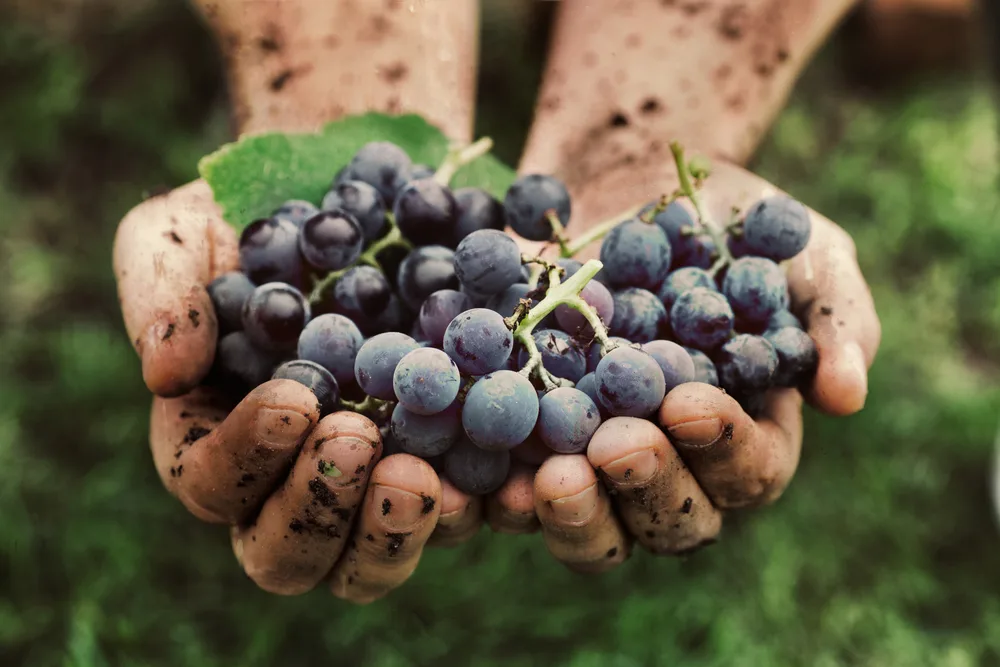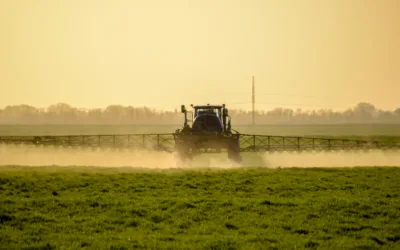Natural Wine: Why you Should Make the Switch
Natural wine, though around since 7000 BC, has become a mark of swank in certain social circles and cities around the world due to its magical taste, purity and health benefits. As a result, natural wines are all the rage in such culinary capitals as Paris, London, Vienna, Tokyo, and New York. I visited Paris and Vienna recently to find that there were eclectic and avant garde wine bars devoted entirely to natural wine. The movement is strong and its captivating allure stems from a passion for pure, unadulterated wine that is as good for your health as the taste and smell are for your senses. Its distinction requires both an understanding of the power behind its creation as well as a madly curious palate.

Natural wine is crafted from an ancient recipe using organic grapes (because before 85 years ago, everything we ate was organic) grown from biodynamic soil and fermented without additives. That’s the simple version. A natural wine maker would have a much more elegant and elaborate description of how this artful elixir is produced. They treat their vineyards like living beings, perhaps with a bit of mysticism mixed in. For me, the real power behind this, dare I say, nostrum, is the incredible health properties it has. Nearly every Blue Zone – regions with the longest living people – has moderate alcohol consumption as part of its culture. The wine they drink, however, is not commercial wine from the supermarket; it’s all natural wine.
To fully appreciate the art of making wine naturally, one must first understand how wines are made conventionally. Archeological records show that drinking wine has been embedded in the world’s culture since around 7000 BC. The only difference between now and then is that they were actually drinking real, natural wine and our modern wine that we drink today is a concoction of more than 76 approved additives that modern winemakers can use to manipulate their wines without listing them on the label (i.e., fish bladders, metals, chemicals, acid, fake oak or berry flavor, sugars and genetically modified yeasts). Real, natural wine doesn’t have additives. That is why natural wine is also called “naked” or “raw” wine – because it is pure.
The reality is that the majority of wines lining your local liquor store shelf were made with more than just grapes. What’s more, pesticides and herbicides have become commonplace in the conventional vineyard. When chemicals began being used on a mass industrial scale post WWII, it was considered ‘progress’, but 80 years later we are beginning to ask what progress actually means. At the end of the day, the answer is subjective. The mass production of processed foods and wines has given us an inexpensive way to shop and consume. But at what cost? Our ‘progress’ has also led to a steady increase in chronic disease and a great disconnect in understanding where our food comes from, how it is grown, and what, in fact, we are actually consuming.
As a functional medicine health coach, my clients often ask me how they can enjoy wine without harming their health. With anything, especially alcohol, moderation is key, but my answer goes far beyond the alcohol itself. Most of us drink wine or alcohol without considering what is actually in it and how those ingredients can impact our health.
Let’s take a distinct look at the differences between conventional and natural wine and why, if you haven’t already, you might consider making the switch.
Conventional wine
1. Conventional Wine is Made with up to 76 Additives
Conventional wines contain ingredients such as ‘mega purple & ultra red’. You may think that the dark red/purple color is natural but, chances are, it is not. Manufacturers can add these super-concentrated coloring agents to change the color. Conventional wine manufacturers add 10,000 gallons of this stuff to an estimated 25 million bottles a year. If you react to food dyes like many people, this could also be a reason you get headaches with wine.
Every time you have a glass of wine, you are unknowingly ingesting chemicals that are toxic to your system. I say “unknowingly”, because wine is the only ‘food’ in the world that doesn’t have to list its ingredients. If you consume wine on a regular basis, it is worth knowing what you are actually drinking. Below is a list of the most common additives that are used in making conventional wine.
Click on the plus sign to see the drop down list.
Acidification
- Tartaric Acid
Clarification
- calcium alginate
- potassium alginate
- potassium caseinate
- casein
- isinglass
- silicon dioxide
- edible gelatine
- acacia (gum arabic)
- milk/lactalbumin
- proteins of plant origin
- ovalbumin (egg white)
- alumino silicates
- ferrous sulfate
Decolorants
- polyvinyl-polypyr-rolidone (PVPP)
- activated charcoal
- Mega purple
- Ultra red
Deacidification
- lactic bacteria
- neutral potassium tartrate
- potassium bicarbonate
- calcium carbonate
Deodorant
- copper sulfate
Elaboration
- sawdust
- oak chips
- metatartaric acid
- water
Enrichment
- concentrated grape must
- rectified concentrated grape must
- saccharose
- tannin
- oxygen
Enzymes
- betaglucanase
- pectolytics
- urease
Fermentation
- fresh lees
- ammonium bisulphite
- thiamine hydrochloride
- yeast cell walls
- yeasts for wine production
- diammonium phosphate
- ammonium sulphate
- ammonium sulphite
- cane sugar
Sequestrants
- fresh lees
- potassium ferrocyanide
- calcium phytate
- citric acid
Stabilization
- calcium tartrate
- potassium bitartrate
- yeast mannoproteins
Preservatives
- sorbic acid
- sulphur dioxide
- argon
- nitrogen
- potassium bisulphite
- dimethyl dicarbonate (DMDC)
- carbon dioxide
- potassium metabisulphite/disulfite
- allyl isothiocyanate
- lysozyme
- potassium sorbate
- ascorbic acid
2. The grapes used are grown with chemicals
Conventional wine grapes are grown with added pesticides, herbicides, fungicides, and other harmful chemicals. The use of chemicals in wine-making has grown 26x (2600%) in the last 50 years. Monsanto’s Roundup is the most widely used herbicide in U.S. vineyards today, and has been linked to numerous cancer cases worldwide.
3. High in added sugar
Many conventional wines have more sugar than a liter of cola. While all wine contains some amount of naturally occurring sugars, natural and conventional wine are not created equal. Many low-quality winemakers add sugar during the fermentation process to increase the alcohol content, or to achieve a particular flavor or sweetness.
The western world’s sugar intake has never been higher. As a result, sugar-related illnesses, such as heart disease, cancer and diabetes, are on the rise with no signs of slowing down. It is not just about the cookies or processed foods you are eating, but added sugar is also in the wine we are drinking.
4. GMO-yeast
Yeast is a tiny one-celled fungus that creates alcohol during fermentation. Yeast occurs naturally in our environment and is on the skin of the grapes used in winemaking. But today, conventional winemakers use cultivated GMO yeast that are added prior to the fermentation. They rely on GMO, lab-made yeasts for fermentation because of their low costs which allow for mass production. While good for business, these are not good for our health.
A medical journal in the National Library for Medicine States, “The results of most studies with GMO foods indicate that they may cause common toxic effects such as hepatic, pancreatic, renal, or reproductive effects and may alter the hematological, biochemical, and immunologic parameters.”
(https://pubmed.ncbi.nlm.nih.gov/18989835/) The take home message here is that GMO foods are not something that you want to be ingesting.
Natural wine producers do not add yeast, much less GMO yeast, but rather let the natural yeast that is already present on the grapes do their magic.
Natural wine
1. High in polyphenols
The antioxidants found in wine are called polyphenols. Grapes produce polyphenols to protect against fungi, bacteria, frost, and other harsh growing conditions. By eating organic grapes or drinking natural wine, those polyphenols protect you in a similar way. They neutralize damaging free radicals that stress your cells. Fruit sprayed with pesticides have no need to ward off pests, so they produce fewer polyphenols. As natural wines are made without chemicals or additives, they have a diverse variety of polyphenols, including resveratrol (lowers inflammation), procyanidins (strong antioxidants), and ellagic acid (helps regulate blood sugar).
2. Benefits your microbiome
This likely comes as a surprise, but drinking natural wine also benefits your gut microbiome. Natural wine is a living product, which means it’s rich with precious bacteria and compounds that enhance your microbiome. Probiotic bacteria are present in natural, unfiltered wine. These bacteria can protect your gut from pathogens, which decreases inflammation. And, believe it or not, can have similar beneficial probiotic benefits as fermented foods do, like sauerkraut and kimchi. With this said, I am by no means suggesting that drinking wine is how you should get your healthy bacteria. Please still take your probiotics and eat your fermented food, as any more than light to moderate drinking can have the opposite effect, killing off your good bacteria.
3. Made without artificial ingredients
No additives or processing aids are used, and ‘intervention’ in the naturally occurring fermentation process is kept to a minimum. As such neither fining nor (tight) filtration are used. The result is a living wine – wholesome and full of naturally occurring microbiology.
4. Organic or biodynamically grown from small family vintners
This means no added pesticides, herbicides, fungicides, or other harmful chemicals. Organic, biodynamic farms are healthy and sustainable for the soil, the diversity of life in the vineyard, and ultimately for us.
5. Dry farmed
Natural wines come from dry farmed vines that get their water from natural rainfall, which saves 16,000 gallons of water per acre. Dry farmed plants have roots that grow up to 50 feet deeper than conventional / irrigated plants, meaning they absorb more nutrients from deep within the soil. Vines are structural parasites and their root systems establish themselves in challenging soils. Given the depths that they will reach for water access, grapevines are also fairly drought-tolerant. In fact, to protect wine quality, irrigation is illegal in some of the world’s best wine regions, particularly in Europe, like Burgundy, Bordeaux, Barolo, Barbaresco, and Brunello.
6. No added sugar
Natural wines are also fully fermented wines. Instead of adding in extra sulfites, natural winemakers allow the yeast to eat all of the natural sugar in the grapes, resulting in wines much lower in sugar. In fact, natural wines can be considered “sugar-free” at less than 1g per bottle.
6. Low in sulfites
Many people have a sensitivity to sulfites which can contribute to side effects such as swelling, digestive pain, and headaches. Since natural wines don’t add in additional sulfites during the fermentation process, it results in wines that only contain low-levels of naturally occurring sulfites.
Natural wines have levels below 30 ppm (the US standard is 350 ppm). Sulfites kill bacteria to stabilize the wine. The lower the sulfites, the more alive a wine remains. You can see the difference under a microscope – low-sulfite wine is vibrant with a diverse spectrum of wild bacteria and yeast.
Where to get natural wine
In many cities, natural wine shops are easy to find, but if you are living in a city like I am that is still a little ‘behind the times’, the best thing to do is to order it online.
In Europe, these are the best online natural wine shops I have found and they are also easy to navigate through in English:
- Wein Skandal:
This is an incredible natural wine shop buried in the courtyard of an old building in the heart of Vienna. To get into the shop you actually have to ring the doorbell and they greet you at the front door. The first time I was there I felt like I was entering into an old American speak easy. They also have a great online shop and ship all over Europe. They speak perfect English, so if you have questions about any bottles, they are happy to help in English too.
https://weinskandal.at/ - Wine Stories:
This is a funky little place in the Netherlands that imports natural wines from small, artisinal wineries. The winemakers “follow nature, the moon and the cosmos and make wines that are wild, from local grapes, fermented with indigenous yeasts and always made with minimal intervention, without filtration, stabilization or adding anything but love. Just wine, like it’s supposed to be. Natural wines, with a story.” I mean, what’s not to love in this!?
https://www.winestories.nl/en/ - 8 Green Bottles:
8 Green Bottles has two wine shops in Berlin and also an awesome online shop that ships all over Europe. The online shop is all in English, so for us expats, it is a big plus!
https://www.8greenbottles.de/en/ladenlokale/ - Rolling Wine:
This is an awesome online Italian natural wine store that is easy to navigate and find exactly what you are looking for. They help you navigate through the Italian regions, grapes, palates and notes to find your perfect bottle.
https://www.rollingwine.com/en/
In the U.S. these are the best online natural wine shops:
- MYSA Natural Wine:
This is a female-owned online natural wine shop that focuses on direct producer-to-consumer shopping.
https://mysa.wine/ - Dry Farm Wines:
An online natural wine club that solely offers sugar-free, low alcohol, organically farmed wines (among other meticulous criteria) from small growers around the world.
https://www.dryfarmwines.com/ - Plonk Wine Club:
This is a funky online natural wine club that focuses on small-production, organic, and biodynamic wines. You can also shop à la carte to build a case (minimum 6 bottles per order).
https://www.plonkwineclub.com/ - Wine Therapy NYC:
Based out of NYC, this online natural wine shop focuses heavily on natural, biodynamic, and organic wines, carrying an eclectic selection of smaller scale producers. They also have some fun online natural wine clubs to choose from.
https://winetherapynyc.com/ - Natural Wine Co:
This is an online natural wine shop with a massive selection to shop from, organized by style and country of origin. They have so many bottles that you can choose from individually (with free shipping over $150), and they have an online natural wine club where you receive 6 or 12 bottles monthly (with free shipping!).
https://naturalwine.com/ - RAW Wine Club:
RAW Wine Club was founded by Isabelle Legeron, France’s first female Master of Wine, and author of an awesome book on natural wine: “Natural Wine: An Introduction to Organic and Biodynamic Wines Made Naturally“.
It’s not an à la carte bottle shop, solely an online natural wine club. “Get 6 bottles, once a month, delivered to your door, complete with Isabelle’s thoughts on each wine and insights from the growers & makers themselves.”
https://club.rawwine.com/
More from Lifestyle
How Inflammation Is Quietly Accelerating Your Aging
We often think of inflammation as the body’s natural response to an injury or some form of tissue damage. This form of acute inflammation is designed to alert our bodies, eliminate harmful invaders and promote tissue repair. But there is a difference between acute/healthy inflammation and chronic/unhealthy inflammation.
Top Tips for People in Pain
My Top Tips for People in PainBy: Ashley Dew So many people in our society are unfortunately dealing with pain on a daily basis. I am not talking about acute pain that comes from acute inflammation, which is normal and important for healing. Chronic pain is...
How to Enjoy the Holidays Without Sacrificing Your Health
How to Enjoy the Holidays Without Sacrificing Your Health While we should all be enjoying this wonderful time of year, it is equally important to enjoy it in a way that we aren’t sacrificing our health and packing on the pounds. Holidays are a time when we are...
How to Reverse Cognitive Decline
Steps to Reverse Cognitive Decline When we think about chronic disease, it’s not uncommon to focus on heart disease, cancer, diabetes, and obesity. These illnesses affect the lives of so many families and duly get a lot of attention in the health and medical...
Benefits of Cold Plunging
Benefits of Cold Water 'Dips'Now that summer is fast approaching, I thought it would be an acceptable time to talk to you about the amazing health benefits of ice baths. You have likely heard a lot of discussion recently about cold plunging because it is a ‘new’ buzz...
Glyphosate: What it is and Why You Should Care
Glyphosate: What it is and Why You Should Care Glyphosate is the most widely-used herbicide in the world. It first went on the market in 1974 as a weed killer and to dry crops out quickly before harvest. Roundup and other glyphosate-based herbicides are still...
How to to Pimp your Vision Board
The new year brings with it a fresh space to create, to think big and to learn how to visualize your goals into existence. You already have what you need in order to build the life you want. You just have to trust that no matter whether something went wrong in the past, you are fully capable of doing things right this time – and it starts with visualizing!
How to Keep the Promises We Make to Ourselves
As the year turned from 2022 to 2023, millions of us resolved to reinvent ourselves into a polished, new and improved version. Some of us pledged to exercise more, use social media less, better respect our inherent needs, drink more water, rise earlier, read more books, eat healthier, journal, reduce our carbon footprint, cut alcohol out for some time, and learn to meditate…. Any of this sound familiar?
Seven Questions for the New Year
Seven Questions for the New YearWhether you are a ‘resolution maker’ or not, here are a few simple, yet reflective questions that can help steer the course for an incredible 2023.1. What is one thing you would like to celebrate about 2022? Before you put on your...
Boost Your Child’s Immune System
How to Boost Your Child’s Immune System.We live in a microbial world, teeming with viruses and bacteria. They are in the air we breathe, the water we drink, the soil on which we stand and on the apples we eat. But they are not only in the external environment; they...










